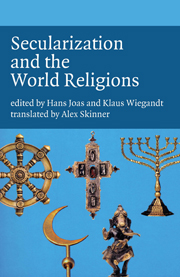Book contents
- Frontmatter
- Contents
- Notes on Contributors
- Foreword
- Society, State and Religion: Their Relationship from the Perspective of the World Religions: An Introduction
- 1 Catholic Christianity
- 2 Protestantism
- 3 The Departure and Return of God: Secularization and Theologization in Judaism
- 4 Islam and Secularization
- 5 Hinduism
- 6 Secularization: Confucianism and Buddhism
- 7 From Hostility through Recognition to Identification: State–Church Models and their Relationship to Freedom of Religion
- 8 ‘Science Doesn't Tremble’: The Secular Natural Sciences and the Modern Feeling for Life
- 9 The Religious Situation in Europe
- 10 The Religious Situation in the USA
- 11 The Religious Situation in East Asia
- 12 The Relevance of the European Model of Secularization in Latin America and Africa
- 13 The Desecularization of the Middle East Conflict: From a Conflict between States to a Conflict between Religious Communities
- Afterword
Society, State and Religion: Their Relationship from the Perspective of the World Religions: An Introduction
- Frontmatter
- Contents
- Notes on Contributors
- Foreword
- Society, State and Religion: Their Relationship from the Perspective of the World Religions: An Introduction
- 1 Catholic Christianity
- 2 Protestantism
- 3 The Departure and Return of God: Secularization and Theologization in Judaism
- 4 Islam and Secularization
- 5 Hinduism
- 6 Secularization: Confucianism and Buddhism
- 7 From Hostility through Recognition to Identification: State–Church Models and their Relationship to Freedom of Religion
- 8 ‘Science Doesn't Tremble’: The Secular Natural Sciences and the Modern Feeling for Life
- 9 The Religious Situation in Europe
- 10 The Religious Situation in the USA
- 11 The Religious Situation in East Asia
- 12 The Relevance of the European Model of Secularization in Latin America and Africa
- 13 The Desecularization of the Middle East Conflict: From a Conflict between States to a Conflict between Religious Communities
- Afterword
Summary
The question of religion, its contemporary and future significance and its role in society and state is currently perceived as an urgent one by many and is widely discussed within the public sphere. But it is also – and has long been – one of the core topics of the historically oriented modern social sciences, indeed, of the modern disciplines of history and philosophy of history since their emergence in the eighteenth century. Increased public interest opens up an opportunity to think in new ways about the immense stock of knowledge furnished by the history of religion and religious studies, theology, sociology and history, and to introduce it into the public conscience. It is of course beyond dispute that a contemporary treatment of these issues cannot remain limited to Europe or the North Atlantic world, but must adopt a truly global perspective. This means that we must take full account of religious traditions other than those of Christianity and consider other parts of the world – beyond Europe and North America. It has, in any event, become quite impossible to draw clear boundaries between territories with respect to concepts of religion – as the notion of the ‘Christian West’, for example, attempts to do. The drawing of such boundary lines has always been problematic historically, as it underestimates the reality of religious pluralism, with respect, for example, to European religious history.
- Type
- Chapter
- Information
- Secularization and the World Religions , pp. 1 - 22Publisher: Liverpool University PressPrint publication year: 2009
- 2
- Cited by



